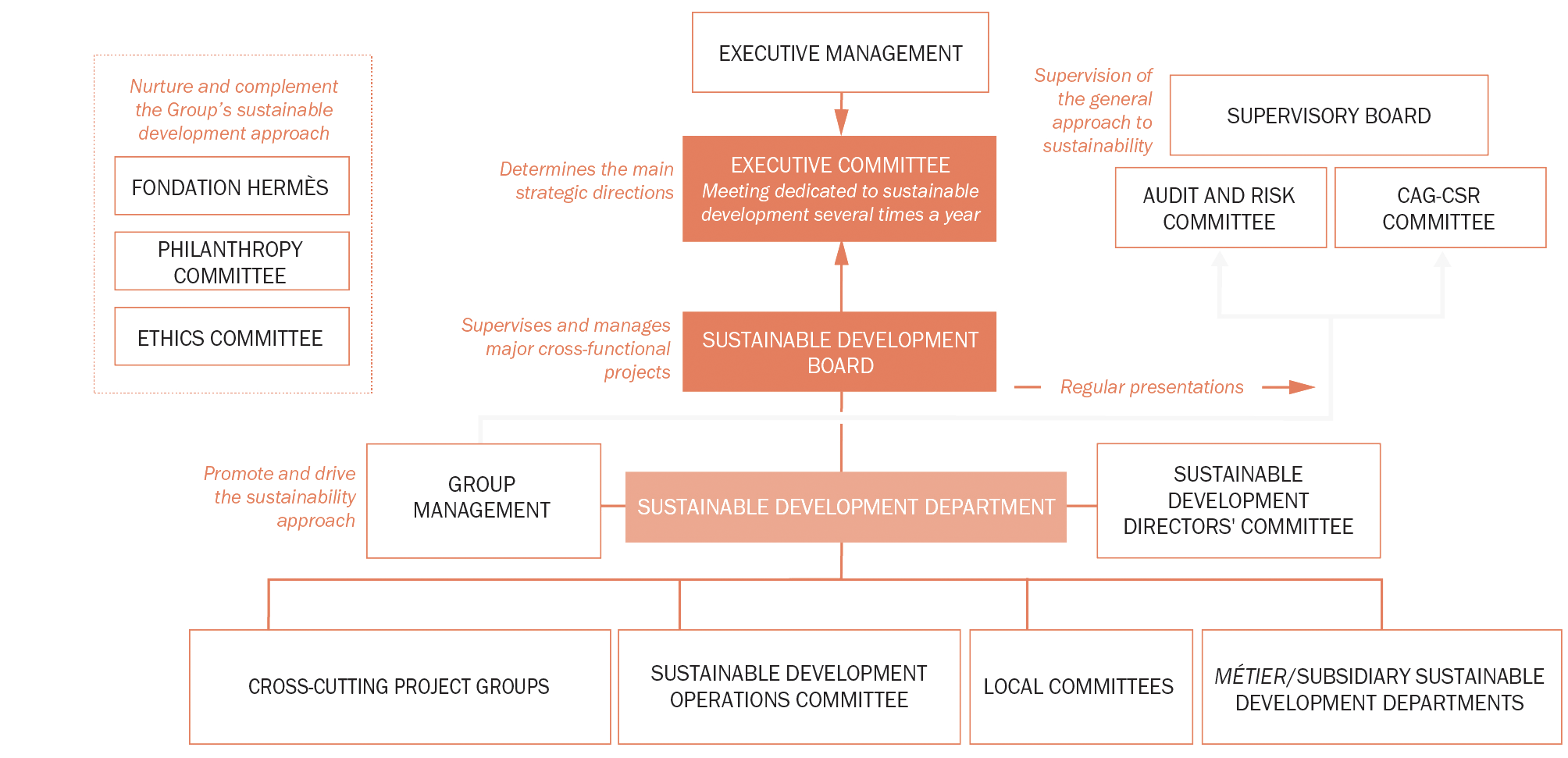Sustainability Governance
Hermès, present worldwide, remains an independent company supported by family ownership, ensuring stability and longevity
Ambition
The house benefits from experienced and balanced governance, allowing for a good consideration of sustainability issues and challenges in its strategy.
At the end of 2022, Hermès updated its internal organization to better manage the group's CSR performance, with increased involvement from its governance bodies. The year 2024 therefore marks the second year of application of this new organizational structure, which positions sustainable development as a strategic priority for the group. The company thus creates the conditions for a systematic, organized, and efficient amplification of its ambitions, while remaining true to its decentralized model and its approach of 'all artisans of our sustainable development'.
2024 Key figures
Organisation
Hermès details the composition and role of its administrative, management, and/or supervisory bodies below :

Supervisory Board
The duties of the Supervisory Board in terms of CSR are as follows :
- the Board is informed, in particular through the CAG‑CSR Committee, of the main issues faced by the Company in the areas of corporate social responsibility and non‑financial performance, as well as sustainability
- the Board regularly reviews, via the Audit and Risk and CAG‑CSR Committees, the sustainability impacts, risks and opportunities, as well as the measures taken as a result
As part of its management control role, the multi‑year strategic guidelines in terms of CSR and their implementation methods were presented to the Supervisory Board.
A comprehensive training program has been set up for Supervisory Board members on environmental and climate issues :
- A multi‑year training programme (2023‑2026) on environmental and climate issues was created in 2023 in collaboration with an external consultancy firm. This programme is structured according to future European ESRS reporting standards to address essential topics, from the environment to ethics
- Practical training : During visits to production sites, members of the Board receive a presentation on the CSR issues of the site concerned
- E-learning module: Since 2023, all members of the Supervisory Board have access to internal e‑learning training modules and are encouraged to participate in them. Various topics are covered such as animal welfare, climate change, and biodiversity
- WWF Conference: Since 2023, all members of the Supervisory Board have been invited to participate in presentations organised jointly by WWF France and the sustainable development department
- IFA training : All members of the Supervisory Board have access to training provided by the Institut français des administrateurs
CAG-CSR Committee
The duties of the CAG‑CSR Committee in terms of CSR are as follows:
- assist the Supervisory Board in monitoring matters relating to CSR and, more generally, sustainability, in order that the Hermès Group better anticipate associated opportunities, challenges and risks;
- assist the Supervisory Board in monitoring the Hermès Group’s social policy and the policy of non‑discrimination and diversity; annually assess the achievement of the three indices making up the CSR criterion of the variable compensation of the Executive Chairmen ;
- monitor the rollout of non‑financial reporting related to the CSRD (jointly with the Audit and Risk Committee);
- assist the Audit and Risk Committee and the Supervisory Board in reviewing the sustainability information to be published by the Company
Joint meetings between the CAG-CSR Committee and the Audit and Risk Committee can be organized. Since 2021, a joint meeting has been dedicated to presenting the exposure to RSE risks.
Audit and Risk Committee
Executive Management is responsible for setting up the information and governance systems that enable the preparation of non‑financial information. A scoping study was conducted in 2023 with the following objectives:
- Monitoring the process of preparing information on sustainability and, where appropriate, making recommendations to ensure its integrity
- Monitoring the process implemented to determine the disclosures to be made in accordance with sustainability reporting standards
- Monitoring the effectiveness of the internal control and risk management systems, as well as, where applicable, the internal audit, with regard to the procedures relating to the preparation and processing of sustainability information
- Issuing a recommendation to the Supervisory Board on the Statutory Auditors certifying the sustainability information or the independent third party proposed for appointment by the General Meeting
- Monitoring the performance of sustainability information certification assignments
- Ensuring compliance with the independence conditions required for stakeholders to carry out sustainability information certification assignments
- Regularly reporting to the Supervisory Board on the results of sustainability information certification assignments
Executive Management and Executive Committee
Executive Management, along with its Executive Committee, plays an active role in the operational implementation of policies, actions, and results in terms of sustainable development. Thus, the major strategic orientations, group objectives, and associated results are all topics monitored by the Executive Committee in joint sessions with the Executive Management. Furthermore, as a reminder, since 2023, the variable remuneration of Hermès Management is partially (up to 10%) conditioned on an 'CSR' criterion composed of three indices (environmental, social, and societal), each weighted at 1/3.
Sustainable Development Board
The Sustainable Development Board comprises directors of the Group’s main central functions and integrated supply chains. This Board oversees the implementation of the CSR approach, steers major cross‑functional projects, oversees the roadmaps of the House’s main entities, launches and monitors ad hoc working groups, and identifies key decisions to be submitted for approval to the Executive Management and its Executive Committee.
Sustainable Development Directors’ Committee (C3D)
To complement the Board’s functions and structure the management of the sustainable development function within the Group, this new body now brings together the sustainable development directors of the métiers, sustainable development functions and subsidiaries within the House. This Committee addresses the management of the entity’s roadmaps and promotes discussion on cross‑functional training and internal communication issues.
Group Operations Committee
Composed of more than 100 members representing the main métiers and central functions, as well as the French‑speaking distribution subsidiaries, it analyses the technical and functional aspects of the projects carried out by the various entities of the House and enables its members to share best practices and topical sustainable development information.
Local Sustainable Development Committees
Led by the main métiers and subsidiaries, they initiate and monitor the actions undertaken. These bodies may be supplemented by management and ad hoc committees when new sustainable development projects are implemented by subsidiaries and entities. Cross‑functional committees, led by Group departments, manage issues, often of a medium‑term nature, that are of common interest. They focus in particular on issues relating to recycling, materials innovation, the circular economy, sustainable construction and logistics.
Métier/subsidiary sustainable development departments
These are responsible for leading the approach at their level and for committing to a CSR roadmap each year. The Group’s main métiers and subsidiaries have a part‑time or dedicated sustainable development manager.
Policies & Publications
To explore further and learn about our key sustainable development policies and our recent publications
